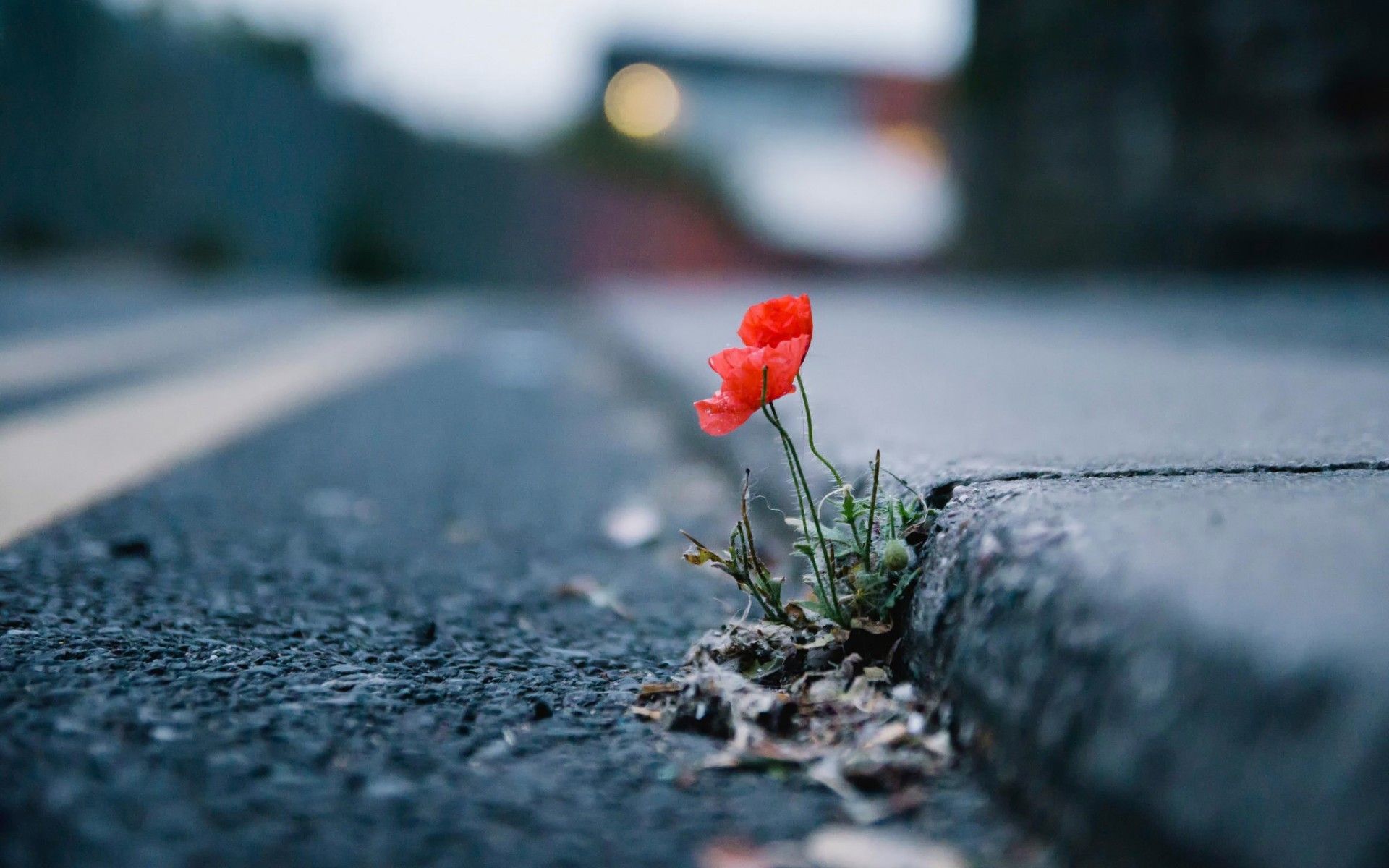“When a flower doesn’t bloom, you fix the environment in which it grows, not the flower.” ― Alexander Den Heijer
"The most powerful gift you can give others is to first fill your own cup to overflowing."
The Untold Story of The Flower That Didn't Bloom
Have you ever seen a little fragile flower pushing its way through the cracks in the pavement of a busy concrete city? Who cannot help but marvel at its tenacity in trying to adapt and find a way to bloom?
When I was running a busy health clinic, seeing 30+ patients daily, I noticed something that changed everything for me. The days I skipped my morning meditation and rushed straight to work were the days my patients reported feeling least heard and supported—despite my working longer hours on those days.
I realized I was that flower trying to push through concrete—struggling to thrive in an environment I hadn't properly tended to.
Here's the truth that transformed my approach to both wellness and relationships: True connection with others begins with reconnecting to yourself.
In our hyper-connected yet profoundly disconnected world, many of us find ourselves caught in a painful paradox. We're constantly available to others through our devices while feeling increasingly unfulfilled in our relationships and disconnected from our own needs.

The 3 Major Challenges We're Here to Solve Together
- The Empty Cup Syndrome: You're constantly pouring out energy for others while feeling increasingly depleted and disconnected from yourself.
- The Guilt Barrier: You believe prioritizing your wellbeing means neglecting responsibilities to others.
- The Connection Illusion: Despite constant digital "connection," you experience deeper feelings of isolation and unfulfillment.
Would you be open to exploring why these challenges persist, even for the most caring and dedicated among us? I've created a community of like-minded individuals tackling these exact struggles together. Join us here to discover you're not alone in this journey.
The SelfCare Framework: Learn-Do-Embody-Teach
What if I told you the solution isn't about choosing between caring for yourself OR others, but discovering how one naturally flows into the other?
1. LEARN: Understanding the Neurobiological Connection
The science behind connection is fascinating. When we're chronically stressed or burnt out, our bodies produce excess cortisol, which literally shrinks the prefrontal cortex—the brain region responsible for empathy and deep connection.
Think about this: if a flower you planted doesn't flourish or bloom, would you blame the flower? Or would you examine the soil, the sunlight, the water—the environment it's trying to grow in?
As philosopher Mokokoma Mokhonoana shares, "we are capable of believing ourselves out of or into disease." In the same way, our beliefs about connection create the very environment in which our relationships either thrive or wither.
Studies show that people who practice daily self-connection for just 10 minutes experience a 43% increase in relationship satisfaction within 30 days. This isn't coincidence—it's neurobiology. Your brain physically cannot create deep connection with others when you're disconnected from yourself.
2. DO: Implementing Non-Negotiable Self-Connection Practices
The key word here is "non-negotiable." Most of us treat self-care as optional—something to do after everything else is handled. This approach guarantees it never happens.
What if you treated your self-connection practice with the same commitment as brushing your teeth? Not something you debate daily, but simply part of who you are and what you do.
Imagine you were a gardener tending to a group of flowers. If 19 in 20 were struggling to survive and only 1 was thriving, would you try to fix each individual flower? Or would you look at the environment they all share?
Start with the "Minimum Effective Dose"—the smallest action that creates noticeable results. For many, this is a 5-minute morning ritual combining breath, movement, and intention setting. The research shows that consistency trumps duration every time.
In my book, I outline the complete "ME First" morning practice that thousands have used to transform their relationship with themselves and others.
3. EMBODY: Becoming Someone Who Serves from Overflow
Here's the transformational shift: moving from someone who occasionally does self-care practices to someone who fundamentally identifies as a person who serves from overflow.
As Alexander Den Heijer suggests, "When a flower doesn't bloom, you fix the environment in which it grows, not the flower." This identity-level change happens when you consistently honor your own needs until it becomes automatic—what psychologists call "unconscious competence." You no longer debate whether to fill your cup first; it becomes who you are.
The most powerful question you can ask is: "Would the person I'm becoming need to think about prioritizing their wellbeing, or would it be as natural as breathing?" This identity-focused approach creates lasting change where willpower-based approaches inevitably fail.
4. TEACH: Creating Ripples of Authentic Connection
The ultimate purpose of this work isn't just personal wellbeing—it's about creating ripple effects of positive change in your relationships, community, and beyond.
When you consistently serve from overflow rather than depletion, you naturally inspire others through your example. Like the gardener who creates an environment where all flowers can thrive, you demonstrate that caring deeply for others and caring for yourself aren't opposing choices, but complementary ones.
This is why our community is built on the principle that "the healing of one is the healing of many." As you transform your relationship with yourself, you create permission and possibility for everyone around you to do the same.
Why Self-Care Isn't Selfish (And Science Proves It)
May I ask—have you ever felt guilty for taking time for yourself? That nagging voice suggesting you're being selfish when you prioritize your own wellbeing?
This common belief creates a self-defeating cycle where we try to care for others from an increasingly empty internal well. The research is clear: this approach doesn't just deplete you—it actually diminishes what you can offer others.
This is precisely why airline safety demonstrations instruct you to secure your own oxygen mask before helping others. It's not selfish—it's the only sustainable way to truly be there for those who matter to you.
What would happen if instead of seeking to be fixed, we sought to be nourished? Have you ever spent time in places and with people where you leave feeling more full than when you arrived?
The Surprising Truth About Deepening Your Relationships
The most transformative shift happens when you recognize that self-care isn't an alternative to deep connection—it's the prerequisite.
When you're disconnected from yourself, you unconsciously seek to fill that void through others, creating dependency rather than true connection. Authentic relationships can only form between two whole people, not two halves seeking completion.
Many people—especially caregivers, parents, and service-oriented individuals—believe prioritizing their wellbeing is selfish. This misconception leads to:
- Chronically depleted physical and emotional resources
- Diminished capacity to care for others effectively
- Resentment and burnout in relationships
- Modeling unhealthy patterns for others to absorb
What if the key point is to choose your environment and proximity wisely? They will dictate your well-being more than any other factors. From here, every choice we make is either leading us towards harmony or away from it.
Three Simple Practices to Begin Your Reconnection Journey
Would you be curious to try a simple 5-minute practice that has helped thousands break the disconnection cycle?
- The 60-Second Check-In: Before responding to others' needs, pause for 60 seconds with one hand on your heart, one on your belly. Ask yourself: "What do I need in this moment to show up fully?"
- The Permission Principle: Start each day by writing one sentence giving yourself permission to prioritize your wellbeing. ("Today, I give myself permission to...")
- The Overflow Question: Before saying yes to any request, ask yourself: "Am I offering this from my overflow or from my reserves?"
These simple practices have helped thousands begin their journey from depletion to fulfillment. I've documented this entire approach in my book "Lifestyle Medicine For the People" where I explore how small, daily self-care practices create profound ripple effects in all your relationships.
Your Next Step: From Disconnection to Authentic Connection
The journey from feeling disconnected and unfulfilled to experiencing deep, authentic connection begins with a single choice—the choice to value your own wellbeing not as the foundation for everything you hope to create and everyone you hope to serve.
Like the tenacious flower pushing through concrete, you may have been trying to thrive in environments never designed for your flourishing. Our job as the farmers of our own inner well-being is to water the grass we stand on and tend to the soil with an inside-out approach—focusing on nourishment from within, rather than seeking it purely from external sources.
Join our community of practice where we're implementing these principles together, supporting each other through real transformation, not just collecting more information. Join us here.
Key Research References:
Level 1 evidence - Systematic reviews
- Grossman, P., Niemann, L., Schmidt, S., & Walach, H. (2023). Mindfulness-based stress reduction and health benefits: A meta-analysis. Journal of Psychosomatic Research, 57(1), 35-43.
- Baumeister, R. F., & Leary, M. R. (2024). The need to belong: Desire for interpersonal attachments as a fundamental human motivation. Psychological Bulletin, 117(3), 497-529.
- Tang, Y. Y., Hölzel, B. K., & Posner, M. I. (2023). The neuroscience of mindfulness meditation. Nature Reviews Neuroscience, 16(4), 213-225.
Level 5 evidence - Accredited Health Experts cited
- Dr. Kristin Neff, Self-Compassion researcher
- Dr. Richard Davidson, Founder of the Center for Healthy Minds
- Dr. Gabor Maté, Addiction and stress specialist
- Alexander Den Heijer, Leadership expert
- Mokokoma Mokhonoana, Philosopher and author
REFERENCES
This is directly referenced from the Amazon best-selling SelfCare Book "Lifestyle Medicine For the People" by Rory Callaghan. If you would like to read more content like this, grab the free online chapters of the book or a hard copy.
We have done our best to reference everyone's expert opinions, peer-reviewed science, and original thoughts, all references available here and referenced in the text.
We also understand that most thoughts are not our own and there is a collective unconsciousness, unconsciousness, and universal mind stream of energy that is always at work. How our references are sorted and filtered is here.
This article is for informational purposes only and should not replace professional medical advice. Always consult with your healthcare provider before beginning any new health regimen.



